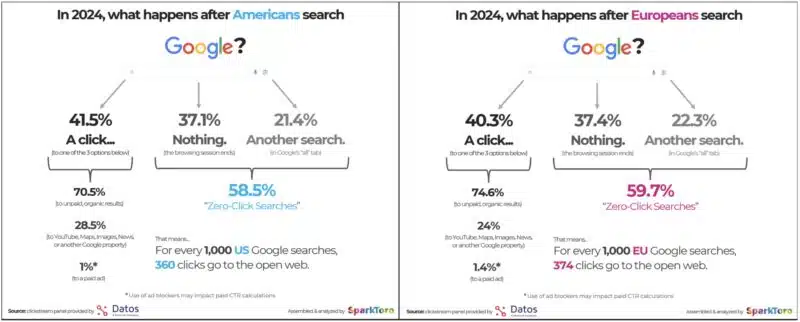Nearly 60% of Google searches end without a click in 2024
Meanwhile, almost 30% of clicks go to Google's properties and about 36% of clicks go to the open web, a new zero-click search study finds.
A majority of Google searches – 58.5% in the U.S. and 59.7% in the EU – result in zero clicks. A zero-click search happens when users end their session or enter a new query without clicking on any results.
This data comes from a new zero-click search study published by Rand Fishkin, SparkToro’s CEO and co-founder, based on clickstream data from Datos, which is owned by Semrush.

Why we care. Clicks impact Google Search rankings. This was confirmed during the Google antitrust trial and is indicated by the findings of the Google Search leak. That said, it’s important to remember that not all users want to click on a link and visit a website to get an answer. Also, many of those zero-click searchers were never your target user/client in the first place, according to technical SEO consultant Pedro Dias on X.
Here are more findings from the study.
Clicks to Google properties. Nearly 30% of all clicks in the U.S. go to Google-owned properties (e.g., YouTube, Google Images, Google Maps), according to the report.
A few “yes, but” thoughts:
- If people click on Google’s YouTube, they will see a video created by a business, brand or creator. In the case of searches with local intent, if someone wants directions to a restaurant or another type of business, does it matter if that person didn’t visit the website to get the same information?
- Yes, Google is keeping people within its ecosystem, but that shouldn’t necessarily be “concerning” if you’re optimizing for more than just Classic Search. Especially if searchers are getting what they want.
- It becomes concerning when Google expands into new verticals and essentially “takes over,” leaving websites to fight for crumbs of organic search traffic.
Dig deeper. Search everywhere optimization: 7 platforms SEOs need to optimize for beyond Google
Traffic to websites. For every 1,000 Google searches, 360 clicks in the U.S. go to the open web; in the EU that number is 374.
- While we don’t know exactly how many Google searches are conducted per day, multiple sites estimate this number to be 8.5 billion. That would mean more than 3 billion clicks per day go to the open web in the U.S. That’s still 3 billion more clicks than any other search engine or answer engine gets in a single day.
AI Overviews. Desktop searches increased “a little” while mobile searches fell “a considerable amount,” when comparing May to the prior four months, the study found. Some context:
- Google launched AI Overviews in May – which was followed shortly thereafter by numerous bad examples of AIO giving dangerous and wrong answers. This led to a big pullback as Google promised to improve the quality of AI Overviews.
- Google has told us that people love AI Overviews (previously Search Generative Experience) and that AI overviews increased search usage – despite offering no actual data to back up its claims.
Dig deeper. Google AI Overviews, clicks and traffic impact: Unraveling the mystery
About the data. The data was collected by Datos’ US & EU panel between September 2022 and May 2024 and represents “a diverse and statistically significant sample of users.” There are many other limitations and caveats mentioned in the report.
While this data is imperfect (just as all data is to some extent), it may help you understand the evolving behavior of searchers as Google shifts more toward becoming an answer engine rather than a search engine.
Dig deeper. Here is Search Engine Land’s coverage of past zero-click studies:
Related stories
New on Search Engine Land